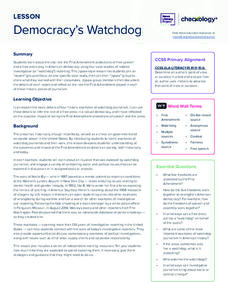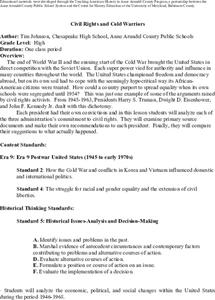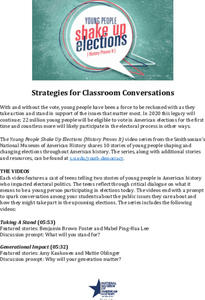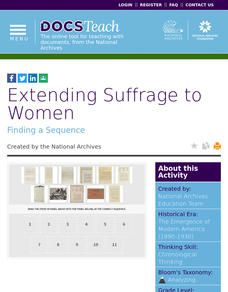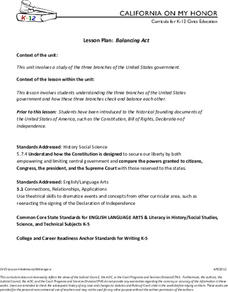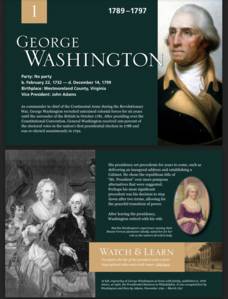DocsTeach
Analyzing an Allegorical Statue
Everyone sees art differently. An informative resource focuses on the image analysis of an allegorical statue. Scholars study the photo of the statue and complete a worksheet based on their findings. To finish, academics participate in...
News Literacy Project
Democracy’s Watchdog
As part of a study of the importance of the First Amendment, expert groups research different historic case studies of investigative reporting, and then the experts share their findings with jigsaw groups. The case studies include Nellie...
DocsTeach
The Path of Justice: Selma and the Voting Rights Act
The civil rights movement: An ongoing battle for change. The activity focuses on President Johnson's speech in response to the massacre at the Selma March. Academics study the speech, complete a hands-on-activity, and discuss President...
DocsTeach
The Impact of Bloody Sunday in Selma
Who is to blame when a peaceful protest turns deadly? Scholars research the impact of the civil rights march in Selma, better known as Bloody Sunday. The activity uses files from the FBI's investigation to help academics understand the...
DocsTeach
The Civil Rights Act of 1964 and the Equal Employment Opportunity Commission
1964: A victory for the civil rights movement! Scholars read a section of the Civil Rights Act of 1964 and discuss what affirmative actions means to them. The resource is a jigsaw activity, with each group focusing on one section of the...
Center for History Education
The Cuban Missile Crisis
Cold War tensions led to hostile actions. Scholars use primary sources to understand the Bay of Pigs and the Cuban Missile Crisis during President Kennedy's administration. The lesson provides primary sources and a graphic organizer to...
Center for History Education
Civil Rights and Cold Warriors
Three presidents, three views on civil rights. Scholars compare the administrations of President Truman, Eisenhower, and Kennedy to understand how each addressed the issue of civil rights. The lesson uses primary sources and graphic...
Center for History Education
Speaking Freely In the Soviet Union's Autocratic Government
Speak your mind! The lesson explores the difference in free speech between the United States and the Soviet Union. Academics review the constitutions of both governments, political cartoons, and case studies to understand how freedom of...
DocsTeach
Containment in Korea: Entering the Korean War
An interesting resource explores President Truman's decision to enter into the Korean War to contain the spread of communism. Historians analyze the document using an online worksheet before participating in group discussion on the...
DocsTeach
Analyzing a Letter About American Indian Voting Rights
An informative activity focuses on the law preventing Native Americans from voting until 1947. Scholars read documents from the Office of Indian Affairs, complete an online worksheet, and participate in group discussion. Academics learn...
DocsTeach
Prohibition and Its Consequences
Organized crime and speakeasies ... just another day during Prohibition. An intriguing activity explores the world of Prohibition and its consequences on life in the United States. Scholars analyze primary sources and place them on a...
Center for History Education
The Founding Fathers and the Constitutional Struggle Over Centralized Power
Believe it or not, the Constitution was America's second attempt at a democratic government. Academics travel back to the past to explore the shortcomings of the Articles of Confederation that would eventually lead to the Constitutional...
Center for History Education
Democratic Ideas of the 1776 Maryland Constitution
1776 was a year of political upheaval in the American colonies. Academics examine the Maryland Constitution to understand the desire to break with Great Britain. Young historians learn about Maryland's efforts to extend rights to its...
Smithsonian Institution
Us vs. Them: The Chinese Exclusion Act of 1882
Immigration issues are nothing new. An interesting lesson focuses on the racially motivated Chinese Exclusion Act of 1882 and its impact on the Chinese American community. Scholars read articles, analyze political cartoons, and...
Smithsonian Institution
Racism and Removal: Japanese Incarceration During World War II
During World War II people saw how far the government's control would go, but it was at the expense of its citizens. The resource brings the conditions of Japanese American internment camps to light using primary documents. Scholars...
Smithsonian Institution
Young People Shake Up Elections (History Proves It) Educator Guide
Vote, it's your civic duty! The resource provides several videos about voting in the United States. Scholars watch a series of topics ranging from youth participation to civic action. The educator's guide provides teachers with...
DocsTeach
Extending Suffrage to Women
Votes for women! The activity highlights the push for the Nineteenth Amendment giving women the right to vote. High school scholars learn how the Fifteenth Amendment giving African American men the right to vote helped to spark the...
Judicial Branch of California
Balancing Act: The Three Branches
What do hula hoops and the American system of government have in common? Using hands-on station activities, pupils consider the roles of the three branches of government. A script for teachers and writing prompts help round out a...
National Woman's History Museum
Fannie Lou Hamer and Social Activism
Not all heroes wear capes. An impactful lesson focuses on the life and activism of Fannie Lou Hamer during the civil rights movement. Scholars read her speeches and other material, participate in group discussion, and complete a jigsaw...
Museum of the American Revolution
Dissecting the Declaration
Delve into the past to understand the issues that led to the Declaration of Independence. Academics read excerpts from the Declaration of Independence and take a virtual tour of the American Revolution Museum. The resource explains how...
Museum of the American Revolution
Hamilton Was Here: Rising Up in Revolutionary Philadelphia
Hamilton may be a hit Broadway show, but there is so much more to learn. An eight-unit resource guides young historians through the life of Alexander Hamilton and the Revolutionary War. The lessons include hands-on-activities, writing,...
C-SPAN
Virtual Presidents Exhibit
Scholars get a glimpse into the lives of all 46 Unites States presidents. An engaging timeline details each president's background and time in office. LInks send pupils to a website with more in-depth information.
DocsTeach
The School Lunch Program and the Federal Government
The school lunch program is rooted in the struggles of the Great Depression and is still assisting families today. Academics research documents and images relating to the creation of the school lunch program. Scholars use a worksheet to...
DocsTeach
The New Deal: Revolution or Reform?
Scholars weigh in on FDR's New Deal policies in an in-depth activity. The resource uses historical documents to explore whether the New Deal polices were reformatory or revolutionary. Learners review documents, rate them using a scale,...



